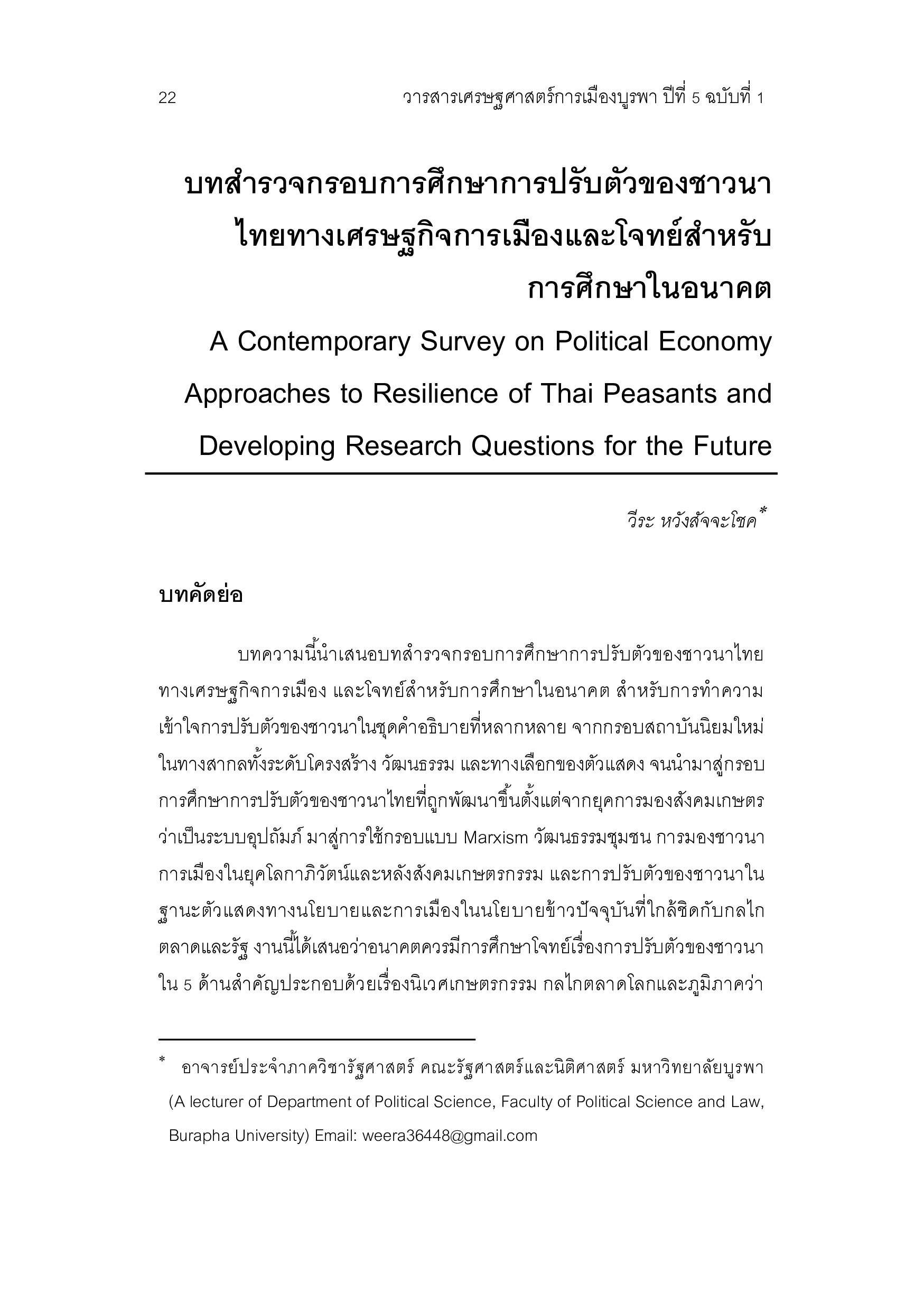A Contemporary Survey on Political Economy Approaches to Resilience of Thai Peasants and Developing Research Questions for the Future
Keywords:
Resilience of Thai Peasants, Developing Research Question for Peasant Studies, Agricultural Political EconomyAbstract
This article demonstrates a contemporary survey on political economy approaches to resilience of Thai peasants and developing research questions for the future. To understand adaptation of peasants, the new institutionalism was employed to indicate levels of analysis, including structure, culture, and choice. In addition, the approaches to resilience of Thai peasants could be divided into five perspectives: patronage system, Marxism, community culture, post-agrarian society, and policy studies. The Thai peasants thus was both policy and political actors that had closely interrelation with market and state mechanisms. But above all, the article proposes developing research questions which consist of peasants’ adaptation under five conditions as agroecology, global and regional rice market, rice price policy, peasant’s organized cooperation, and agricultural welfare state.
References
เอกสารภาษาไทย
กาญจนา แก้วเทพ. (2527). จิตสำนึกของชาวนา: ทฤษฎีและแนวการวิเคราะห์แบบเศรษฐศาสตร์การเมือง. กรุงเทพฯ: สมาคมสังคมศาสตร์แห่งประเทศไทย.
กนกศักดิ์ แก้วเทพ. (2530). บทวิเคราะห์สหพันธ์ชาวนาชาวไร่แห่งประเทศไทย: เศรษฐศาสตร์การเมืองว่าด้วยชาวนาสมัยใหม่. กรุงเทพฯ: โครงการหนังสือเล่ม สถาบันวิจัยสังคม จุฬาลงกรณ์มหาวิทยาลัย.
_______. (2542). “การต่อสู้ของชาวนาไทย ปี 2516-2519: สหพันธ์ชาวนาชาวไร่แห่งประเทศไทย”. ใน เส้นทางชาวนาไทย: รำลึก 25 ปี สหพันธ์ชาวนาชาวไร่แห่งประเทศไทย. กรุงเทพฯ: มูลนิธิโกมลคีมทอง.
กรีนวูด, เดวิด เจ. (2554). เศรษฐกิจการเมืองของชาวนา. มงคลเลิศ ด่านธานินทร์ (แปล). กรุงเทพฯ: จุฬาลงกรณ์มหาวิทยาลัย.
ฉัตรทิพย์ นาถสุภา. (2527). เศรษฐกิจหมู่บ้านไทยในอดีต. กรุงเทพฯ: สร้างสรรค์.
ฉัตรทิพย์ นาถสุภา และคณะ. (2541). ทฤษฎีและแนวคิดเศรษฐกิจชุมชนชาวนา. กรุงเทพฯ: อมรินทร์พริ้นติ้นแอนด์พับลิซซิ่ง.
ณรงค์ เพ็ชรประเสริฐ. (2548). การเมืองเรื่องข้าว ภายใต้อำนาจรัฐทุนผูกขาด. กรุงเทพฯ: ศูนย์ศึกษาเศรษฐศาสตร์การเมือง คณะเศรษฐศาสตร์ จุฬาลงกรณ์มหาวิทยาลัย.
เดวิด บรูซ จอหน์สตัน. (2530). สังคมชนบทและภาคเศรษฐกิจข้าวของไทย พ.ศ. 2523-2473. พรภิรมณ์ เอี่ยมธรรม และคณะ (แปล). กรุงเทพฯ: มหาวิทยาลัยธรรมศาสตร์.
ธนพันธ์ ไล่ประกอบทรัพย์ และคณะ. (2560). รัฐ ชาวนา การเปลี่ยนแปลงในภาคการเกษตร และการกำหนดนโยบายข้าว: รวมบทความจากประสบการณ์จากห้องวิจัยและการวิจัยภาคสนาม. กรุงเทพฯ: ภาควิชาการปกครอง คณะรัฐศาสตร์ จุฬาลงกรณ์มหาวิทยาลัย.
นิพนธ์ พัวพงศกร. (2556). “บทที่ 7: ผลกระทบจากนโยบายแทรกแซงราคาข้าวของรัฐ”. ใน รายงานฉบับสมบูรณ์ โครงการยุทธศาสตร์ข้าวไทย การวิจัยพัฒนาข้าวไทยและการมองไปข้างหน้า. กรุงเทพฯ: โครงการการเฝ้ามองนโยบายเกษตรไทย สำนักงานกองทุนสนับสนุนการวิจัย (สกว.).
ประภาส ปิ่นตบแต่ง. (2542). “การต่อสู้ของชาวนาไทย ปี 2475-2516”. ใน เส้นทางชาวนาไทย: รำลึก 25 ปี สหพันธ์ชาวนาชาวไร่แห่งประเทศไทย. กรุงเทพฯ: มูลนิธิโกมลคีมทอง.
ประเวศ วะสี. (2531). แนวคิดและยุทธศาสตร์สังคมสมานุภาพและวิชชา. กรุงเทพฯ: มูลนิธิโกมลคีมทอง.
วีระ หวังสัจจะโชค. (2555) “การควบคุมของรัฐต่อสังคมชนบทผ่านนโยบายจำนำข้าว: ความสัมพันธ์ระหว่างรัฐและสังคม กับกรณีศึกษาอำเภอบางระกำ จังหวัดพิษณุโลก”. วารสารสำนักบัณฑิตอาสาสมัคร, 9 (1): 172-206.
_______. (2556). การจัดสถาบันของนโยบายจำนำข้าว. ดุษฎีนิพนธ์หลักสูตรรัฐศาสตรดุษฎีบัณฑิต, สาขาวิชารัฐศาสตร์, คณะรัฐศาสตร์, จุฬาลงกรณ์มหาวิทยาลัย.
สุธี ประศาสน์เศรษฐ และคณะ. (2544). เศรษฐกิจ-เศรษฐศาสตร์ทางเลือก. กรุงเทพฯ: คณะกรรมการดำเนินงานฉลอง 100 ปี ชาตกาล นายปรีดี พนมยงค์ รัฐบุรุษอาวุโส.
สุภา ใยเมือง และคณะ. (2559). โครงการทบทวนความรู้และพัฒนาโจทย์เพื่อการปรับตัวของชาวนาไทยภายใต้การเปลี่ยนแปลงการผลิตและการตลาดข้าว. กรุงเทพฯ: สำนักงานกองทุนสนับสนุนงานวิจัย (สกว.).
สมพร อิศวิลานนท์. (2553). ข้าวไทย: การเปลี่ยนแปลงโครงสร้างการผลิตและช่องทางการกระจาย. กรุงเทพฯ: ชุดโครงการการเฝ้ามองนโยบายเกษตรไทย สถาบันคลังสมองของชาติ.
อคิน รพีพัฒน์. (2548). ระบบอุปถัมภ์กับการพัฒนาสังคม : ด้านหนึ่งในการเปลี่ยนแปลงสังคมไทย. กรุงเทพฯ: มหาวิทยาลัยธรรมศาสตร์.
อรรถจักร์ สัตยานุรักษ์ และคณะ. (2558). โครงการความเปลี่ยนแปลง "ชนบท" ในสังคมไทย : ประชาธิปไตยบนความเคลื่อนไหว. กรุงเทพฯ : สำนักงานกองทุนสนับสนุนการวิจัย.
อัมมาร์ สยามวาลา. (2522). ข้าวในเศรษฐกิจไทย. กรุงเทพฯ: มูลนิธิโครงการตำราสังคมศาสตร์และมนุษยศาสตร์.
อัมมาร สยามวาลา และวิโรจน์ ณ ระนอง. (2533). ประมวลความรู้เรื่องข้าว. กรุงเทพฯ: สถาบันวิจัยเพื่อการพัฒนาประเทศไทย.
อรรถจักร์ สัตยานุรักษ์. (2559). ลืมตาอ้าปาก จาก "ชาวนา" สู่ "ผู้ประกอบการ". กรุงเทพฯ: มติชน.
เอกสารภาษาต่างประเทศ
Chatterjee, P. (2008). "Peasant Cultures of the Twenty: First Century". Journal of Inter-Asia Cultural Studies, 9 (1): 116-126.
Embree, J. F. (1950). “Thailand: A Loosely Structured Social System”. American Anthropologist, 52 (2): 181-193.
Hall, P. A. & Rosemary C. R. T. (1996). “Political Science and the Three New Institutionalisms”. Political Studies, 44 (5): 936–957.
Keyes, C. (1976). “Local Leadership in Rural Thailand”. In Clark Neher (ed.). Modern Thai Politics. Cambridge: Schenkman.
Laiprakobsup, T. (2014). “Populism and Agricultural Trade in Developing Countries: A Case Study of Thailand’s Rice-Pledging Scheme”. International Review of Public Administration, 19 (4): 380-394.
Moore, B. (1966). Social Origins of Dictatorship and Democracy: Lord and Peasant in the Making of the Modern World. Massachusetts: Beacon.
Nishizaki, Y. (2014). “Peasants and the Redshirt Movement in Thailand: Some Dissenting Voice”. The Journal of Peasant Studies. 41 (1): 1-28.
Pongsawat, P. (2001). “Political Economy of Agrarian Transformation and Peasant Movements in Contemporary Thailand: A Critical Observation”. Journal of Social Science, 32 (2): 1-73.
Popkin, S. L. (1979). The Rational Peasant: The Political Economy of Rural Society in Vietnam. Berkeley: University of California.
Reynolds, C. & Lisa H. (1982). “Marxism in Thai Historical Studies”. Journal of Asian Studies, 43 (1): 77-104.
Scott, J. C. (1977). The Moral Economy of the Peasant: Rebellion and Subsistence in Southeast Asia. New Haven: Yale University.
_______. (1985). Weapons of the Weak: Everyday Forms of Peasant Resistance. New Haven: Yale University.
Skocpol, T. (1979). States and Social Revolutions: A Comparative Analysis of France, Russia, and China. Cambridge: Cambridge University.
Walker, A. (2012). Thailand's Political Peasants: Power in the Modern Rural Economy. Wisconsin: University of Wisconsin.






